全新版第二版第一册unit8课文翻译电子教案
李荫华《全新版大学英语综合教程(1)》(第2版)(全文翻译unit8)【圣才出品】
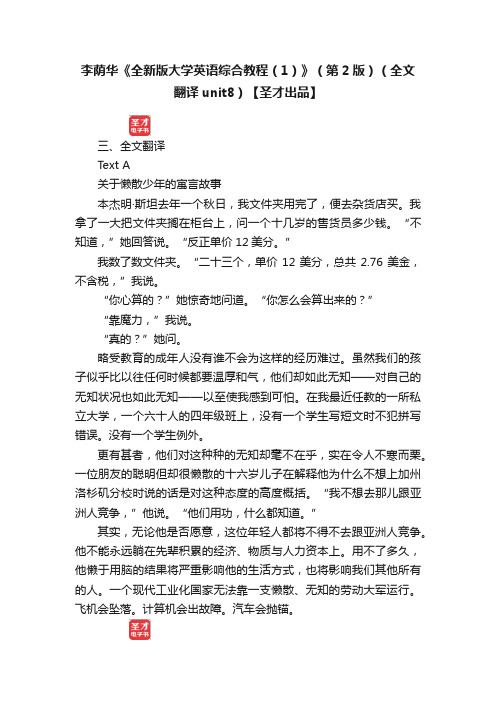
李荫华《全新版大学英语综合教程(1)》(第2版)(全文翻译unit8)【圣才出品】三、全文翻译Text A关于懒散少年的寓言故事本杰明·斯坦去年一个秋日,我文件夹用完了,便去杂货店买。
我拿了一大把文件夹搁在柜台上,问一个十几岁的售货员多少钱。
“不知道,”她回答说。
“反正单价12美分。
”我数了数文件夹。
“二十三个,单价12美分,总共2.76美金,不含税,”我说。
“你心算的?”她惊奇地问道。
“你怎么会算出来的?”“靠魔力,”我说。
“真的?”她问。
略受教育的成年人没有谁不会为这样的经历难过。
虽然我们的孩子似乎比以往任何时候都要温厚和气,他们却如此无知——对自己的无知状况也如此无知——以至使我感到可怕。
在我最近任教的一所私立大学,一个六十人的四年级班上,没有一个学生写短文时不犯拼写错误。
没有一个学生例外。
更有甚者,他们对这种种的无知却毫不在乎,实在令人不寒而栗。
一位朋友的聪明但却很懒散的十六岁儿子在解释他为什么不想上加州洛杉矶分校时说的话是对这种态度的高度概括。
“我不想去那儿跟亚洲人竞争,”他说。
“他们用功,什么都知道。
”其实,无论他是否愿意,这位年轻人都将不得不去跟亚洲人竞争。
他不能永远躺在先辈积累的经济、物质与人力资本上。
用不了多久,他懒于用脑的结果将严重影响他的生活方式,也将影响我们其他所有的人。
一个现代工业化国家无法靠一支懒散、无知的劳动大军运行。
飞机会坠落。
计算机会出故障。
汽车会抛锚。
为使这样的美国青年彻底认识到这一点,我的愚见是:拍一部电影,或电视连续剧,生动地描述我们国家的今天如何来之不易——而要丧失这一切又何其容易。
下面我奉献一篇寓言故事。
故事开始时,我们的主人公凯文·汉利1990,一名十七岁的高三学生,正坐在自己房间里,心情痛苦。
他父母一定要他准备欧洲史考试。
而他则想去买一副激光唱片随身听的耳机。
他被迫要读的书——《各国的财富》——让他打瞌睡。
凯文进入梦乡,时值1835年,他是他本人的曾太祖父,十七岁,是爱尔兰克雷郡的——个农民。
李荫华《全新版大学英语综合教程(1)》(第2版)(全文翻译 unit8)【圣才出品】
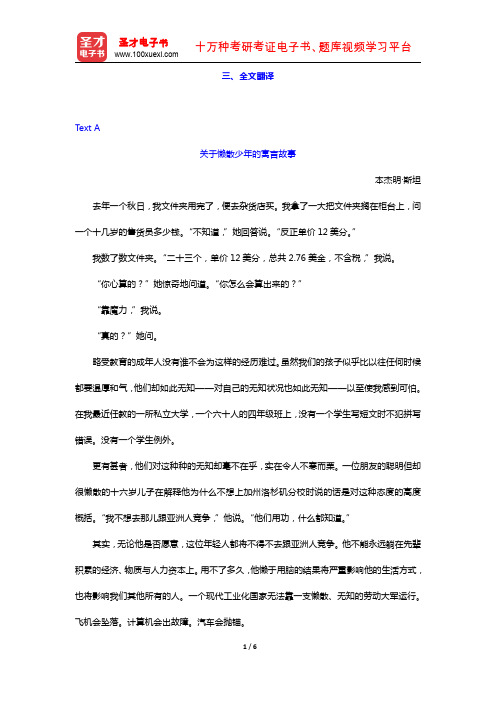
三、全文翻译Text A关于懒散少年的寓言故事本杰明·斯坦去年一个秋日,我文件夹用完了,便去杂货店买。
我拿了一大把文件夹搁在柜台上,问一个十几岁的售货员多少钱。
“不知道,”她回答说。
“反正单价12美分。
”我数了数文件夹。
“二十三个,单价12美分,总共2.76美金,不含税,”我说。
“你心算的?”她惊奇地问道。
“你怎么会算出来的?”“靠魔力,”我说。
“真的?”她问。
略受教育的成年人没有谁不会为这样的经历难过。
虽然我们的孩子似乎比以往任何时候都要温厚和气,他们却如此无知——对自己的无知状况也如此无知——以至使我感到可怕。
在我最近任教的一所私立大学,一个六十人的四年级班上,没有一个学生写短文时不犯拼写错误。
没有一个学生例外。
更有甚者,他们对这种种的无知却毫不在乎,实在令人不寒而栗。
一位朋友的聪明但却很懒散的十六岁儿子在解释他为什么不想上加州洛杉矶分校时说的话是对这种态度的高度概括。
“我不想去那儿跟亚洲人竞争,”他说。
“他们用功,什么都知道。
”其实,无论他是否愿意,这位年轻人都将不得不去跟亚洲人竞争。
他不能永远躺在先辈积累的经济、物质与人力资本上。
用不了多久,他懒于用脑的结果将严重影响他的生活方式,也将影响我们其他所有的人。
一个现代工业化国家无法靠一支懒散、无知的劳动大军运行。
飞机会坠落。
计算机会出故障。
汽车会抛锚。
为使这样的美国青年彻底认识到这一点,我的愚见是:拍一部电影,或电视连续剧,生动地描述我们国家的今天如何来之不易——而要丧失这一切又何其容易。
下面我奉献一篇寓言故事。
故事开始时,我们的主人公凯文·汉利1990,一名十七岁的高三学生,正坐在自己房间里,心情痛苦。
他父母一定要他准备欧洲史考试。
而他则想去买一副激光唱片随身听的耳机。
他被迫要读的书——《各国的财富》——让他打瞌睡。
凯文进入梦乡,时值1835年,他是他本人的曾太祖父,十七岁,是爱尔兰克雷郡的——个农民。
他住在小小的陋室里,睡在一头猪旁。
全新版大学英语(第二版)综合教程 第1册 Unit 8 Fable of the Lazy Teenager
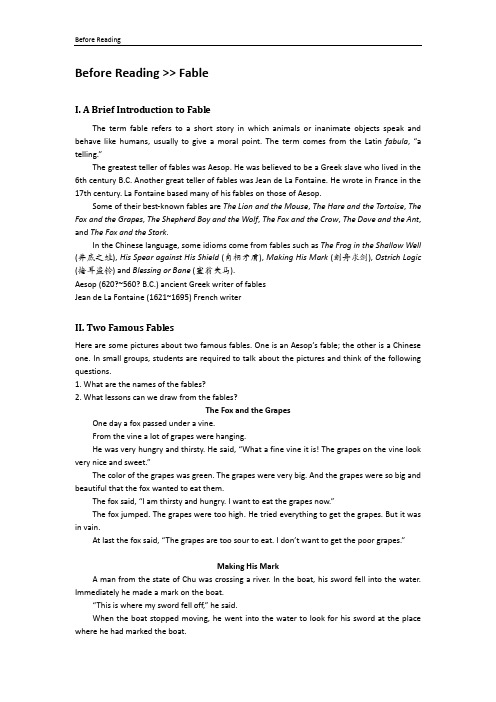
Before Reading >> FableI. A Brief Introduction to FableThe term fable refers to a short story in which animals or inanimate objects speak and behave like humans, usually to give a moral point. The term comes from the Latin fabula, “a telling.”The greatest teller of fables was Aesop. He was believed to be a Greek slave who lived in the 6th century B.C. Another great teller of fables was Jean de La Fontaine. He wrote in France in the 17th century. La Fontaine based many of his fables on those of Aesop.Some of their best-known fables are The Lion and the Mouse, The Hare and the Tortoise, The Fox and the Grapes, The Shepherd Boy and the Wolf, The Fox and the Crow, The Dove and the Ant, and The Fox and the Stork.In the Chinese language, some idioms come from fables such as The Frog in the Shallow Well (井底之蛙), His Spear against His Shield (自相矛盾), Making His Mark (刻舟求剑), Ostrich Logic (掩耳盗铃) and Blessing or Bane (塞翁失马).Aesop (620?~560? B.C.) ancient Greek writer of fablesJean de La Fontaine (1621~1695) French writerII. Two Famous FablesHere are some pictures about two famous fables. One is an Aesop’s fable; the other is a Chinese one. In small groups, students are required to talk about the pictures and think of the following questions.1. What are the names of the fables?2. What lessons can we draw from the fables?The Fox and the GrapesOne day a fox passed under a vine.From the vine a lot of grapes were hanging.He was very hungry and thirsty. He said, “What a fine vine it is! The grapes on the vine look very nice and sweet.”The color of the grapes was green. The grapes were very big. And the grapes were so big and beautiful that the fox wanted to eat them.The fox said, “I am thirsty and hungry. I want to eat the grapes now.”The fox jumped. The grapes were too high. He tried everything to get the grapes. But it was in vain.At last the fox said, “The grapes are too sour to eat. I don’t want to get the poor grapes.”Making His MarkA man from the state of Chu was crossing a river. In the boat, his sword fell into the water. Immediately he made a mark on the boat.“This is where my sword fell off,” he said.When the boat stopped moving, he went into the water to look for his sword at the place where he had marked the boat.The boat had moved but the sword had not. Is this not a very foolish way to look for a sword?III. Some Famous English Sayings from FablesHere are some famous sayings in English. You are required to answer the following questions and then tell each fable as briefly as possible.1. What are the Chinese equivalents of these sayings?2. From which fable does each saying come?- Sour grapes.- Killing the goose that lays the golden eggs.- One good turn deserves another.- Don’t count your chickens before they’re hatched.Sour grapes.It means “酸葡萄” in Chinese. This saying comes from the fable The Fox and the Grapes. In it the fox cannot reach the grapes. Disappointed, the animal says that the grapes are sour and that they are “not fit for a gentleman’s eating.”Killing the goose that lays the golden eggs.It means “杀鸡取卵” in Chinese. T his saying comes from the fable The Goose with the Golden Eggs. In it the owner of the goose is not satisfied with one golden egg a day. He cuts the goose open to see if there is gold inside.One good turn deserves another.It means “善有善报” in Chinese. Thi s saying comes from the fable The Dove and the Ant. In it a dove saves an ant from drowning in a river. Later the ant saves the dove’s life by stinging a hunter in the foot, making him miss his aim at the dove.Don’t count your chickens before they’re hatc hed.It means “蛋未孵别先数小鸡” in Chinese. This saying comes from the fable The Maid and the Pail of Milk. In it a girl carries a pail of milk on her head. She dreams about the eggs she will buy when she sells the milk. The eggs will hatch; then she will sell the chickens. With the money she has earned, she will buy fine clothes for herself. Thinking about the new clothes, the girl becomes so happy that she merrily tosses her head and spills the milk.Before Reading >> Adam Smith and The Wealth of NationsI. Adam Smithi. A Brief Introduction to Adam SmithAdam Smith (1723~1790): British philosopher and economistAdam Smith, economist and philosopher (哲学家), was born in Kirkcaldy, Scotland in 1723. At Glasgow University he became a professor of logic (逻辑学) (1751) and moral (道德) philosophy (1752~1763). As a tutor to the Duke of Buccleuch he traveled the Continent from 1764 to 1766. In 1776 he moved to Edinburgh as commissioner (专员) of customs for Scotland. He died there in 1790. He is considered the father of modern economic theory. His famous workThe Wealth of Nations points out that labor is the only source of a nation’s wealth.ii. Chronology of Adam Smith— 1723Born in Kirkcaldy, Scotland.— 1737 ~ 1746Educated at the Universities of Glasgow and Oxford.— 1748 ~ 1751Gave lectures on rhetoric (修辞学) and belles-lettres (纯文学) in Edinburgh.— 1752 ~ 1764Appointed professor of moral philosophy at the University of Glasgow.— 1759His first book, The Theory of Moral Sentiments, was published.— 1764 ~ 1766Traveled France and Switzerland as tutor to the Duke of Buccleuch and met Turgot and Necker in Paris and discussed their economic ideas.— 1766 ~ 1776Lived in Kirkcaldy preparing The Wealth of Nations.— 1778Appointed commissioner (专员) of customs and went to live in Edinburgh.— July 17, 1790Died.II. The Wealth of NationsThis is an important work of economic and social theory by Adam Smith, published in 1776. Its full title was An Inquiry into the Nature and Causes of the Wealth of Nations. In it he analyzed the relationship between work and the production of a nation’s wealth. His conclusion was that the best economic situation results from encouraging free enterprise (an economic system in which there is open competition in business and trade, and no government control). This idea has had a great influence on economic theories since and it formed the basis of the economic policies of the Conservative government in Britain in the 1980s.Before Reading >> U.C.L.A.U.C.L.A. stands for University of California at Los Angeles. It is the largest of eight branches of the University of California. It was established in 1919 and now has about 35,000 students. Maybe because of its location close to Hollywood, the school is known especially for its film studies and the campus is used for some television and movie shoots.Global Reading >> Part Division of the TextGlobal Reading >> Further UnderstandingI. For Part 1i. InterviewSuppose you are a journalist and your partner is the author of the text. You have an interview with him. The interview should cover the following points:1. the happening in the drugstore — the reason why the author went there; a dialogue between the salesgirl and him2. the author’s feeling to the happening — the problems American teenagers are facing such as ignorance, poor ability of calculations and other things3. something about the son of the author’s friend4. the aut hor’s purpose of offering a fableii. Questions and Answers1. Why did the author go to the drugstore one day?(He wanted to buy some file folders.)2. How old was the salesgirl?(Under 20 years old.)3. What was the salesgirl’s reaction to the author’s mental arithmetic (心算)?(She was very surprised at it.)4. Did the salesgirl believe that the author did calculations by magic? Why or why not?(Yes. Maybe she believed it because she could never do that.)5. What was the author?(He was a teacher at a college.)6. What did the author think of American teenagers?(He thought they are ignorant and lacking in knowledge of world history and geography.)7. In the author’s opinion, what was the most serious problem for American teenagers?(They were indifferent to their ignorance.)8. Why did the author give us the example of his friend’s son?(He just intended to show the seriousness of the problem.)9. According to the author, what would happen if there was an idle, ignorant labor force in amodern industrial state?(There would be many problems in society such as plane crashes, computer jams and breakdowns of cars.)10. What was the author’s purpose of offering a fable?(He just wanted to make American teenagers understand the danger of their ignorance and intellectual laziness.)II. For Part 2 Rearrange the Order of the PicturesEach of the following pictures stands for a Kevin Hanley in a certain year. Match the picture with the description and then tell the class how this Kevin lives. (图略)– Kevin 1835, a poor peasant in Ireland– Kevin 1928, a steel-mill worker in Pittsburgh, U.S.A.– Kevin 1945, a soldier fighting the Japanese army– Kevin 1966, a student who studies all the time so as to get into college and law school– Kevin 1990, a cleaner in a Japanese-owned factory– Kevin 2020, a porter in a hotel for wealthy Europeans and Asians– Kevin 2050, living in a slum and searching through trash piles for foodDetailed ReadingI. Difficult Sentences1.“You did that in your head?” she asked in amazement. (Para. 3)1) What does the word “that” refer to?(It refers to “the author’s doing mental arithmetic.”)2) What can we infer from this sentence?(The children like the girl in the text are very poor at calculations and they can never do mental arithmetic like the man does.)2.No modestly educated adult can fail to be upset by such an experience. (Para. 6)1) What is the meaning of the phrase “such an experience”?(The phrase “such an experience” means “the salesgirl’s ignorance.”)2) Paraphrase the sentence.(Any adult who has got average education will feel worried and unhappy about the ignorance the girl shows.)3.The ability to perform even the simplest calculations is only a memory among many students I see, and their knowledge of world history or geography is nonexistent. (Para. 7)Translate the sentence into Chinese.(在我所见过的许多学生中,再也没有过去学生都有的哪怕是进行最简单的计算的能力,他们对世界历史和地理都一无所知。
(全新版)大学英语《综合教程》第一册Unit8

• Language Study
• 1. run out of: use up or finish a supply of (sth.) • Examples: 1) To our disappointment, our car ran out of gas halfway home. • 2) When they ran out of food, the soldiers set about hunting for more. • 2. handful: a small number (used as singular noun, followed by of) • Examples: 1) You'd better hurry up. A handful of people are already waiting in the hall. • 2) I have to give up the plan because only a handful of students are willing to spend the New Year's Eve on campus. • 3. in amazement: with a feeling of great surprise or disbelief • Examples: 1) Aunt Sophia gazed at her picture in amazement: she looked like a teenage girl in it. • 2) All the people in the lecture hall stared at him in amazement when he talked loudly with his friend.
英语-Unit-8--教案--第一册--新

visit the science and technology centers参观科技馆
go bungee jumping蹦极
go fishing钓鱼
go hunting打猎
go skiing滑雪
go travelling旅游
go running跑步
Top tenwhite water rafting destinations in the United States
Green River绿河
Nenana River尼纳纳河
Salmon River鲑鱼河
Chattooga River查托格河
Flathead River弗拉特黑德河
Rogue River罗格河
步骤三:全班活动,教师挑选几位同学的短文进行点评,指出其短文的优点或缺点,供其他同学借鉴。
【说明】本活动旨在锻炼学生的写作能力,对写作内容进行了大概界定,要求学生表达对给定度假方式的看法,是一种命题式写作。
Text
目的:提高学生的阅读能力,训练学生从文章中获取信息的能力,并为学生完成本部分的学习任务提供语言素材。
A.
听力前的准备工作。
【说明】就对话中出现的生词进行简单讲解,减少学生的听力障碍。
B
Activity 1Listen and answer.
【操作】
步骤一:全班活动,教师放第一遍录音,学生仔细聆听。
步骤二:全班活动,教师放第二遍录音,学生边听录音,边给出答案。
步骤三:全班活动,教师讲解对话内容,逐句翻译,并抽查学生的答案,作出反馈。
go camping野营
goto the cinema看电影
新编大学德语第二版第一册学生用书第八单元生词例句翻译
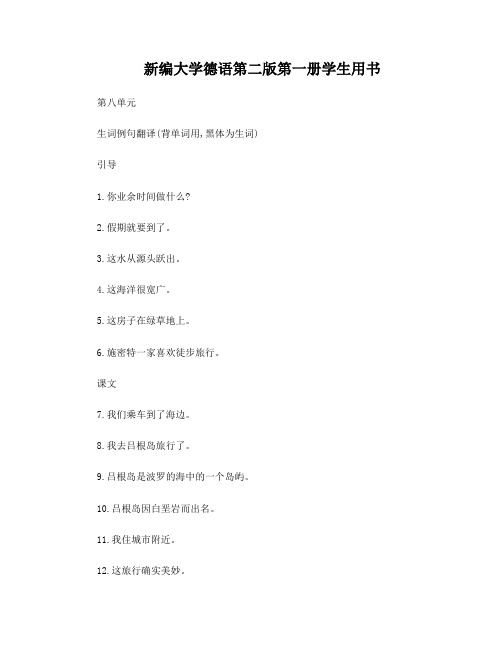
新编大学德语第二版第一册学生用书第八单元生词例句翻译(背单词用,黑体为生词)引导1.你业余时间做什么?2.假期就要到了。
3.这水从源头跃出。
4.这海洋很宽广。
5.这房子在绿草地上。
6.施密特一家喜欢徒步旅行。
课文7.我们乘车到了海边。
8.我去吕根岛旅行了。
9.吕根岛是波罗的海中的一个岛屿。
10.吕根岛因白垩岩而出名。
11.我住城市附近。
12.这旅行确实美妙。
13.风很暖和。
14.波浪来得很快。
15.他们去沙滩上散步。
16.他在河里游泳。
17.这里的生活是梦幻般的。
18.我一定要去一次吕根岛。
19.这是不言而喻的。
20.我拍了很多照片。
21.旅行期间下了大雨。
22.旅程持续三小时。
23.她必须写个报告。
24.她报告了什么?25.他在这片土地上度过了一个月,体验了很多。
26.我在花园里工作了。
27.他赚了很少一点钱。
28.我完成了在这个公司的实习。
29.您能翻译这个说明书吗?30.您也在市场部工作吗?31.这些产品质量很好。
32.谁在学管理?33.这是非常有用的。
34.他正在写毕业论文。
35.我每周打工两次。
36.我必须自己支付学习的费用。
37.我学了编程。
38.这机会确实很棒。
39.他的建议对我们的工作很重要。
40.这对我们的职业生涯很重要。
习题41.我待在家里了。
42.我们常互发邮件。
43.饭后闲逛很健康。
44.柏林市就是很棒。
45.纪念大教堂在市中心。
46.亚历山大广场很热闹。
47.这附近有市场吗?48.你尝过甜葡萄酒吗?49.人们什么时候吃姜饼?50.您到底得到了什么?51.在踢足球方面,他想起世界杯。
听力52.他不是很理解现在的青年。
53.她常去青年中心。
54.她正在上摄影班。
55.他能画得很好。
56.我能一起来吗?当然。
57.戴眼镜的年轻人看起来很酷。
58.价格也很低。
59.她一周上两次补习班。
60.他会很多种语言。
阅读理解61.这附近有宿营地吗?62.海德堡市位于哪?63.内卡河是南德的一条河。
全新版大学英语(第一册)第二版电子教案Unit8
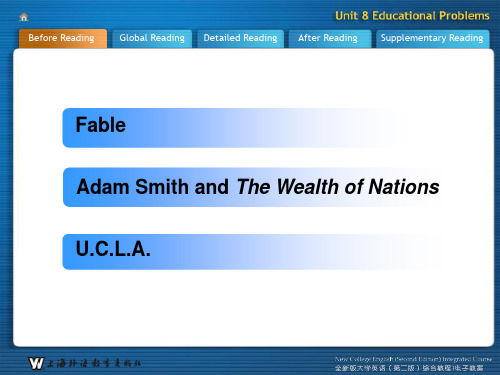
Before Reading
Global Reading
Detailed Reading
After Reading来自Supplementary Reading
Some of their best-known fables are The Lion and the Mouse, The Hare and the Tortoise, The Fox and the Grapes, The Shepherd Boy and the Wolf, The Fox and the Crow, The Dove and the Ant, and The Fox and the Stork. In the Chinese language, some idioms come from fables such as The Frog in the Shallow Well (井底之蛙), His Spear against His Shield (自相矛盾), Making His Mark (刻舟求剑), Ostrich Logic (掩耳盗铃) and Blessing or Bane (塞翁失马).
Before Reading
Global Reading
Detailed Reading
After Reading
Supplementary Reading
Two Famous Fables Here are some pictures about two famous fables. One is an Aesop’s fable; the other is a Chinese one. In small groups, students are required to talk about the pictures and think of the following questions. 1. What are the names of the fables? 2. What lessons can we draw from the fables?
《综合教程》第2版第一册-精品-Unit8省公开课一等奖全国示范课微课金奖PPT课件

Western festivals
• Valentine’s Day
5/58
Easter
6/58Biblioteka Mother’s & Father’s Day
7/58
Halloween
8/58
Thanksgiving Day
9/58
Christmas
10/58
Chinese & Western festivals
• 3) My mailbox eventually had a rural address, and the job of hand-delivering candy and cards was relegated to the U.S. Postal Service. (Paragraph 7)
• Because the first and last gifts her father offered her are the most impressive and the most unforgettable ones.
13/58
Structural analysis
• Part I (Para. 1-2) • It gives a brief account of the narrator’s father and
• Focus on the following aspects: 1. When is the festival? 2. Why is there such a festival? Or why do people
celebrate it? 3. What are some symbols? 4. What do people do to celebrate it?
- 1、下载文档前请自行甄别文档内容的完整性,平台不提供额外的编辑、内容补充、找答案等附加服务。
- 2、"仅部分预览"的文档,不可在线预览部分如存在完整性等问题,可反馈申请退款(可完整预览的文档不适用该条件!)。
- 3、如文档侵犯您的权益,请联系客服反馈,我们会尽快为您处理(人工客服工作时间:9:00-18:30)。
全新版第二版第一册u n i t8课文翻译A fable for tomorrow (Rachel Carson)There was once a town in the heart of America where all life seemed to live in harmony with its surroundings. The town lay in the midst of a checkerboard of prosperous farms, with fields of grain and hillsides of orchards where, in spring, white clouds of bloom drifted above the green fields. In autumn, oak and maple and birch set up a blaze of color that flamed and flickered across a backdrop of pines. Then foxes barked in the hills and deer silently crossed the fields, half hidden in the mists of the fall mornings.从前在美国中心有一个小镇,那里的万物看上去都与其四周的环境融洽相处。
小镇的四周是像棋盘交错的生意盎然的农庄,还有一块块的田地和一座座遍布山坡的果园。
春天来了,白色的鲜花云彩般地漂浮在田野上;秋天到了,橡树、枫树和桦树色彩斑斓,在一片松树林间火焰般地燃烧与跳跃。
小山上狐狸吠叫,田野间小鹿静静地跃过,所有的一切都在秋天清晨的薄雾中半隐半现。
Along the roads, laurel, viburnum and alder, great ferns and wildflowers delighted the traveler's eye through much of the year. Even in winter the roadsides were places of beauty, where countless birds came to feed on the berries and on the seed heads of the dried weeds rising above the snow. The countryside was, in fact, famous for the abundance and variety of its bird life, and when the flood of migrants was pouring through in spring and fall people traveled from great distances to observe them. Others came to fish the streams, which flowed clear and cold out of the hills and contained shady pools where trout lay. So it had been from the days many years ago when the first settlers raised their houses, sank their wells, and built their barns.在路的两旁,一年中许多时候,月桂树、荚莲、桤木、蕨类植物和各样的野花都能让过往的行人赏心悦目。
即使是冬天,路边的景色依旧是美不胜收,那里无数的小鸟来觅取浆果莓和露在雪地上的枯枝上的种子。
事实上,这乡村正是由于鸟类的数量和种类之繁多而出名的。
在候鸟群潮涌而来的春秋季节,人们从大老远的地方慕名前来欣赏。
还有的人来这里的小溪垂钓。
清冽的溪水从山中流出,溪水中有许多鳟鱼藏身的背阴的水潭。
所以,从许多年前开始,第一批居住者就在这里盖房挖井,搭起了自己的谷仓。
Then a strange blight crept over the area and everything began to change. Some evil spell had settled on the community: mysterious maladies swept the flocks of chickens; the cattle and sheep sickened and died. Everywhere was a shadow of death. The farmers spoke of much illness among their families. In the town the doctors had become more and more puzzled by new kinds of sickness appearing among their patients. There had been several sudden and unexplained deaths, not only among adults but even among children, who would be stricken suddenly while at play and die within a few hours.后来,一种奇怪的摧毁力悄然袭击了这个地区,所有的一切都开始变了。
某种邪恶的符咒笼罩了这个社区:神秘的疾病攻击了鸡群,牛、羊也纷纷病死,到处都有一层死亡的阴影。
农夫们谈论着家中的许多疾病;镇上的医生也越来越因病人中出现的新的病症而感到迷惑。
在成人和孩子中发生了好几起突发的不明其由的死亡,那些孩子在玩耍中突然病倒,几小时后就死去了。
There was a strange stillness. The birds, for example - where had they gone? Many people spoke of them, puzzled and disturbed. The feeding stations in the backyards were deserted. The few birds seen anywhere were moribund; they trembled violently and could not fly. It was a spring without voices. On the mornings that had once throbbed with the dawn chorus of robins, catbirds, doves, jays, wrens, and scores of other bird voices there was now no sound; only silence lay over the fields and woods and marsh这里是一派奇怪的寂静。
就说鸟儿们吧---它们都去哪儿了?许多人说起鸟儿的时候都充满了迷惑与不安。
他们后院的饲养站已经没有鸟儿光顾了。
随处能见到的几只鸟都奄奄一息。
他们猛烈地颤抖,却飞不起来。
这是一个无声的春天。
曾经是震动着画眉鸟、猫鸟、鸽子、樫鸟、欧鹪和许多鸟儿的黎明合唱声的清晨如今却寂然无声。
田野间、树林中和沼泽地里也是一片寂静。
On the farms the hens brooded, but no chicks hatched. The farmers complained that they were unable to raise any pigs - the litters were small and the young survived only a few days. The apple trees were coming into bloom but no bees droned among the blossoms, so there was no pollination and there would be no fruit.在农庄,母鸡下蛋却孵不出小鸡。
农夫们抱怨无法养猪,因为刚生下的猪崽太小了,小猪也只能活几天的功夫。
苹果树开花了,可是没有蜜蜂在花丛中嗡嗡地采蜜,没有蜜蜂的授粉,也就没有任何果子。
The roadsides, once so attractive, were now lined with browned and withered vegetation as though swept by fire. These, too, were silent, deserted by all living things. Even the streams were now lifeless. Anglers no longer visited them, for all the fish had died.曾经是如此迷人的路旁如今却铺着黑黑的枯干的草木,仿佛是被一场大火烧过一般。
那里也是一片寂静,因为所有的生物都遗弃了它。
即使是溪流中也没有了生命。
因为所有的鱼都已经死了,垂钓者也就不再来了。
In the gutters under the eaves and between the shingles of the roofs, a white granular powder still showed a few patches; some weeks before it had fallen like snow upon the roofs and the lawns, the fields and streams.在屋檐下的天沟里,屋顶的木瓦之间仍旧可见几片白色的粒状的粉末。
几个星期之前,它像白雪一样洒在了屋顶上、草地上、田野里和溪流里。
No witchcraft, no enemy action had silenced the rebirth of new life in this stricken world. The people had done it themselves.在这个遭受袭击的地球上,没有巫术,也没有敌人的行动抑制了新生命的复苏;这一切都是人自身造成的。
Since the mid-1940's, over 500 basic chemicals have been created for use in killing insects, weeds, rodents, and other organisms described in the modern vernacular as "pests", and they are sold under thousand different brand names.自20世纪40年代中期起,人们制造了500多种基本的化学药品来杀死在现代语言中被称作"害虫"的昆虫、杂草、啮齿动物和其他的生物体,以几千种的品牌名称来出售它们。
